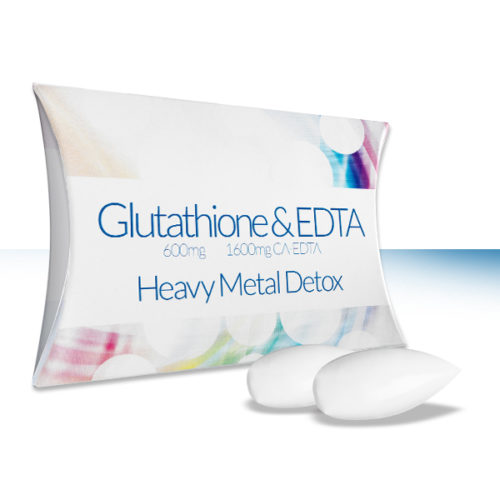Posts Tagged ‘glutathione’
Glutathione & EDTA Detox
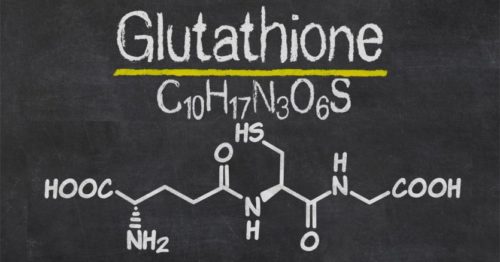
Glutathione is an amino acid sometimes called the “master antioxidant” of the human body. It accounts for a huge percentage of your total antioxidant capacity. And it’s not something that you can get from food. Most foods have some glutathione, but the glutathione you eat is broken down by digestion before it ever gets where you want it. Studies have found that dietary glutathione isn’t actually associated with glutathione levels in the blood, and supplementing with glutathione is an extremely inefficient (and expensive) way to raise glutathione levels by a very small amount.
Instead of eating it in food, your body produces glutathione itself. And if your capacity to do that is impaired, it’s a big deal. Glutathione is crucial for detoxification in the liver; unlike some other detoxification schemes that will remain nameless, it actually has documented evidence of a benefit. It’s also necessary for healthy immune function and general antioxidant defenses against free radicals. Low levels of glutathione are associated with health problems from overtraining to HIV/AIDS.
Here’s a look at why it’s so important, and some interventions that actually work for raising glutathione levels.
What Glutathione Does
Glutathione does all kinds of things! Two of the most important are assisting with detoxification in the liver and its anti-inflammatory/immune function.
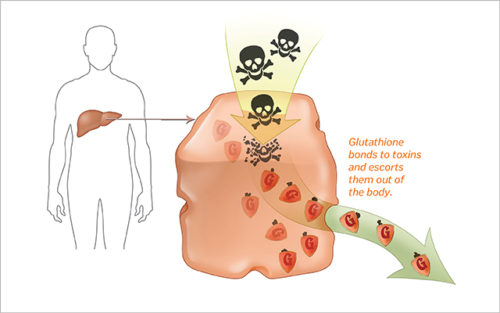
Glutathione and Detoxification
Glutathione is critical for detoxification in the liver (you know, the thing that actually helps you detoxify, unlike weird footpads and lemon juice cleanses). In the liver, glutathione binds to toxins before they’re excreted, which is an important step in getting them out of your body. In fact, the detox power of glutathione is so powerful that it’s used for people who overdose on Tylenol (acetaminophen) and have to go to the hospital to detox. In that case, the person gets an IV with another amino acid that helps their body make glutathione, called N-acetyl cysteine (NAC). The NAC increases their body’s production of glutathione, which helps their liver get rid of the acetaminophen.
Glutathione may also be very important for helping your body get rid of toxins in your food and environment. For example, one study found that in people who eat a lot of fish, the total amount of mercury the people retained in their bodies was related to genes regulating glutathione synthesis. The more glutathione people made, the less mercury they retained.
Glutathione Body Detoxification: Some Toxic Insurgents
Deadly Chemicals in Your Shampoo Understanding the sham in shampoo.
Pesticides on Food
Plastics: The Safe and Health Harmful.
Fluoride in Drinking Water Drinking fluoridated water can result in fluoride poisoning and numerous disease processes. When reacting to other ingredients in water in makes for even more toxic dangers. Did you know it is in many common foods and beverages?
Radiation results in a unique type of poisoning.
Benzopyrenes
Auto Exhaust
Smoking and Tobacco
Smog
Heavy Metal Toxicity
The Toxic Element Mercury
Amalgam Dental Fillings
Lead Poisoning
Cadmium
Cobalt
Copper
Syndromes and Sensitivities
Chronic Fatigue Syndrome
Multiple Chemical Sensitivity
Gulf War Syndrome
Chemical Solvents
Acetone
Alphaic hydrocarbons (vinal chloride, hexachlorohexane, plastics)
Gasoline Related Blood Disease
These are among the many other substances detoxified by glutathione conjugation.
Anti-Inflammatory and Immune Benefits
Of course, glutathione is most famous for its general antioxidant effects. This study defined glutathione as “a first line of defense” against oxidative stress. Other enzymes that rely on glutathione also provide a backup. If you’re not really sure what that means or why it’s good, the explanation you’re looking for is right here: to give the very short version, antioxidants help protect your cells from DNA damage that can cause serious problems down the line.Brain
This is particularly important in the brain. Of all the tissues in your body, your brain is one of the most vulnerable to oxidative stress: it’s full of unsaturated fats, and it uses a lot of oxygen (20% of your daily oxygen consumption goes to your brain). Combine fragile unsaturated fats with a lot of oxygen, and you’ve got a recipe for oxidative damage…unless glutathione is there to save the day. Some new research has suggested that lower glutathione levels may make the brain more vulnerable to damage in neurodegenerative diseases like Parkinson’s.
The defense against oxidative stress helps keep inflammation under control. Glutathione also has more direct effects on the immune system. Glutathione is important for natural killer cells – “natural killer” sounds like something you don’t want in your body, but in this case the natural killers are on your side, fighting off viruses and bacteria that try to attack you. For example, this study explores how glutathione affects natural killer cells (one type of immune cells) in a way that might help fight off tuberculosis.
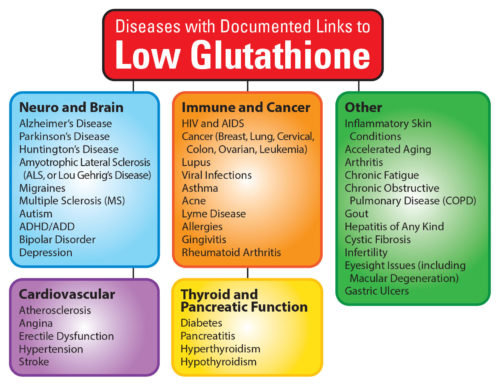
Who has Low Glutathione Levels?
You can see the importance of glutathione by taking a look at what kinds of diseases are typically associated with low glutathione levels. This study and this one give a partial list of people who have unusually low levels of glutathione.
Elderly people. Aging is associated with lower glutathione levels. It’s not clear whether this is caused by inadequate protein consumption or problems synthesizing glutathione.
Patients with wasting diseases (most famously HIV/AIDS)
Patients with lung cancer and other pulmonary diseases
Patients with major injuries, sepsis, and trauma
Patients with gut diseases like Inflammatory Bowel Disease (Crohn’s Disease and ulcerative colitis)
Patients with Chronic Fatigue Syndrome
Overtrained athletes
People with alcoholism or fatty liver disease
People with diabetes and lower glucose tolerance
In many of these cases, raising glutathione levels has shown some therapeutic benefits.
Diet, Lifestyle, and Glutathione
Taking glutathione itself as a supplement isn’t very helpful, because it’s not absorbed well and your gut basically breaks it all down, so it doesn’t do much good. The typical way to raise glutathione levels is to give a person another amino acid called N-acetyl cysteine (NAC). This is what’s done in hospitals for Tylenol overdose. Taking NAC provides your body with L-cysteine, which removes one barrier to producing more glutathione. Taking NAC supplements can help restore glutathione levels in elderly people to the levels normally found in young people.
Other studies have examined various other ways to increase glutathione activity:
This study suggests that exercise can increase glutathione levels. The study also compared cardio, weight training, and a combination of both, and found that the combination program was the most effective.
This study found that older adults who ate the most dairy had the highest concentration of brain glutathione. The study was also funded by the dairy industry, and contradicts an earlier study showing no effect, so take it with a massive grain of salt.
In rats, at least, a ketogenic diet can increase glutathione levels.
Cruciferous vegetables (like broccoli, cauliflower, cabbage, Brussels sprouts, and the rest of that family) may be very helpful, but the effect in humans might depend on genetic differences in glutathione production.
Garlic and onions, like cruciferous vegetables, are rich in sulfur. Sulfur is a precursor to glutathione, and eating enough sulfur-rich vegetables can help make sure you aren’t limiting your glutathione supply.
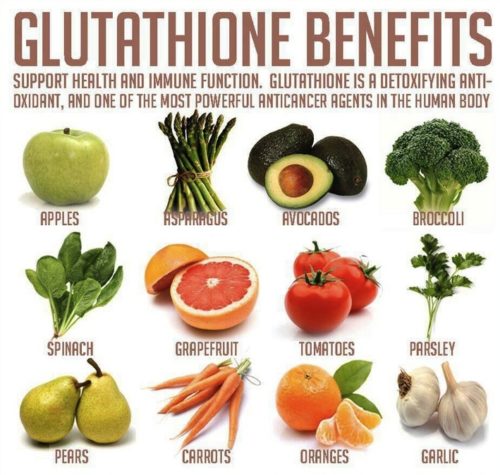
Finally a Convenient and Potent EDTA Detox
Ethylenediaminetetraacetic acid (EDTA) is a chemical which is formulated to attract and bind to harmful bodily heavy metals such as aluminum, chromium, lead, and mercury within the bloodstream. After luring these potentially toxic materials throughout the body, EDTA is designed to be efficiently and safely excreted in the urine with substantial quantities of heavy metals in tow. This denies toxins which have penetrated the bloodstream the chance to do serious damage across multiple bodily systems.1,2
EDTA is often administered via an IV injection. While this ensures a greater potency than any form of oral intake, it can be inconvenient and generally more expensive. EDTA suppositories provide a much needed middle ground between the convenience of oral intake and the high absorption rates of IV intake. The tissues of the lower bowel are especially porous and facilitate an easy passage for EDTA into the bloodstream with impressive rates of absorption.
Cleansing the Body with Central Antioxidant Glutathione
Glutathione is such a critically important antioxidant within the body that it’s difficult to know where to start when describing its benefits. It’s primary role, along with most antioxidants, is to help the body in neutralizing free radicals, thereby reducing accumulations of oxidative stress. Free radicals are essentially atoms within our body that have unpaired electrons. They will seek to pair said electrons by stealing one from other molecules in the body, creating a chain reaction of damage and imbalance to fats, proteins and cell membrane alike. This damage is referred to as oxidative stress. Antioxidants are able to pair with these unbalanced free radicals without becoming significantly damaged or unbalanced themselves, thus neutralizing the threat. When quantities of free radicals exceed those of crucial antioxidants like glutathione, more and more cells will become contaminated and oxidized. This oxidative stress is thought to be at the root of numerous life-threatening health concerns, and even the process of aging itself.3
In addition to neutralizing the free radicals generated by toxins, glutathione also aids in the removal of toxins before they are able to cause significant damage to the body. It achieves this by binding to toxins in the liver before they are excreted. This makes their excretion (and the overall function of the liver) more efficient. The liver, a central detoxifying organ, relies on an ample supply of glutathione to stay healthy and function optimally.4
Glutathione must be absorbed into the bloodstream in order to be effective. Suppository intake is a convenient way to regularly and conveniently add to your body’s supply of glutathione with rates of absorption comparable to IV intake.
